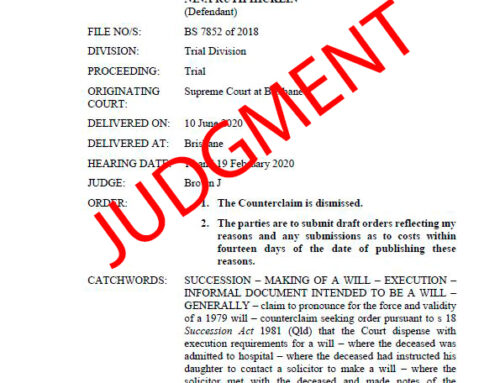Having a power of attorney is just as important as having a will. While a will operates on your death, a power of attorney operates during your life.
The Power of Attorney Act (Qld) 1998 increased the scope of matters that can be covered by an enduring power of attorney and allows you to give directions about your future health care.
WHAT IS A POWER OF ATTORNEY?
A power of attorney is a legal document authorising another person, such as a trusted friend or relative, to act on your behalf in your affairs. This person is known as your “attorney”.
It is a convenient method of allowing someone to handle your affairs if you: go overseas; take an extended holiday; suffer poor health; or reach an age when you need greater assistance.
Knowing you have an attorney capable of dealing with your affairs when you are absent or infirm gives you peace of mind.
APPOINTING AN ATTORNEY
Your appointed attorney must be 18 years of age; must not be your health care provider (for example your doctor); must not be a bankrupt; or must not be a paid carer (receiving a carer’s pension does not stop a person from being an attorney).
It is important you choose someone you trust, who is capable of looking after your affairs. You may wish to appoint more than one attorney.
To appoint an attorney you must be able to understand fully what the appointment means.
TYPES OF POWERS OF ATTORNEY
A power of attorney can be: a general power of attorney, or an enduring power of attorney.
– GENERAL POWER OF ATTORNEY
A general power of attorney is used in a business context by a corporation or an individual. It can authorise your attorney to deal with your personal or financial affairs, or both, and comes into effect on the date you elect. It may limit the extent to which your attorney may deal with those matters.
A general power of attorney does not operate when you lose capacity to make decisions.
– ENDURING POWER OF ATTORNEY
An enduring power of attorney comes into effect on the date or event (e.g. incapacity) you elect and continues to operate when you lose capacity to make decisions.
Under an enduring power of attorney, you may give your attorney the power to deal with all or any part of your financial, personal and health matters. Everyone over 18 years of age should have an enduring power of attorney.
Having arranged an enduring power of attorney, you may continue to handle your affairs while you have the mental capacity to do so. Your attorney, however, can deal with your affairs at the same time unless you specify otherwise.
WHY HAVE AN ENDURING POWER OF ATTORNEY
Everyone is at risk of accident or unexpected mental illness. If you lose your mental capacity and do not have an enduring power of attorney, your personal and business affairs may be handled by a government official, for a fee, or a family member or friend will be required to apply to the Guardianship and Administration Tribunal for an order to act as your administrator. The person who obtains such an order may not be the person you would have chosen to administer your personal and business affairs.
Contact Cooke Hutchinson Lawyers to discuss your Powers of Attorney and other estate planning matters by phoning 1800 000 993 or by email info@cookehutchinson.com.au





